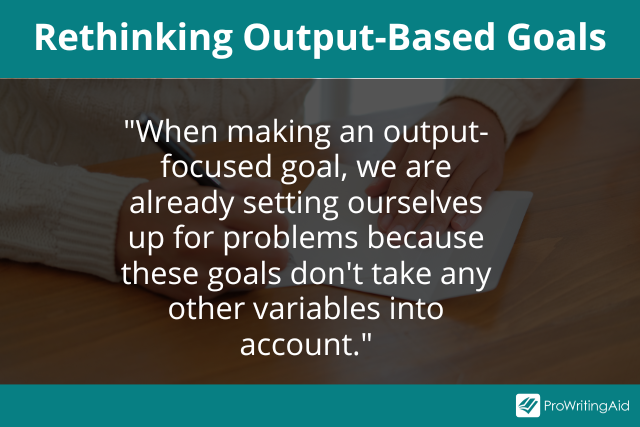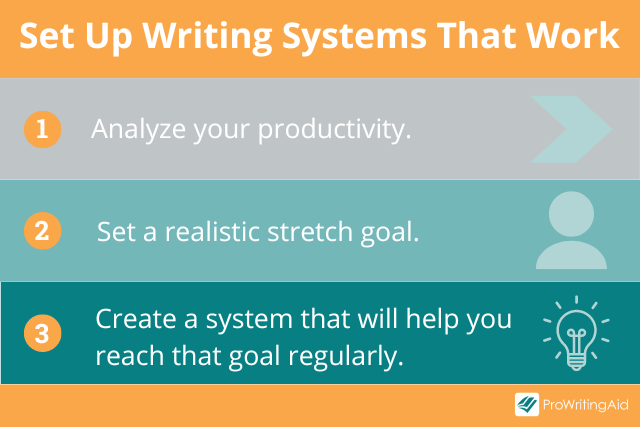
I spent a fair amount of time over the last year and a half being a ghostwriter. Deeply in debt and charging by the word, ghostwriting moved from "a fun way to make money" to "an incredibly stressful experiment in turning myself into a words-producing robot so that bills could be paid."
In order to pay my bills, I had to produce a certain number of words every month. Whenever I took on a new book writing project, I had to break it down into manageable goals so that I could keep myself from going insane and also be sure that I was hitting benchmarks.
Make those benchmarks and books would get written, bills would be paid, and life would be good.
Miss those benchmarks and nobody gets paid while the work piles up.
With all of that wonderful pressure on my shoulders, I explored different ways of setting goals for my writing, testing to see what would put me on the right track, and which methods would help my brain get into that "zone" that all of us writers salivate for.
Surprisingly, setting goals about what I needed to accomplish wasn't the best strategy.
The Two Strategies
Let's assume that a book is 80,000 words (a common length for my assignments).
If I wanted to write every weekday but have weekends off, that gives me 20 days on average to write a book. With those numbers, I would have to produce at least 4,000 words per weekday to pull it off, right?
Some months, I would aim for 4,000 words per day, tracking them in a spreadsheet.
Other months, I would aim for a time goal: sit down in the chair and write for, say, 90 minutes per day on each project.
Which one do you think worked better for me?
The Problem with Focusing on Output
The first goal – 4,000 words per day – is probably the most common type of goal that we set. I'm not basing that on any research studies, it just sounds like what we do when we set goals, doesn't it?
- "I want to lose 30 pounds."
- "I want to make $5,000 per month."
- "I want to write 4,000 words per day."
See how they are all similar? Output-focused goals are incredibly common. They are the types of goals that make the most sense to us. We can wrap our heads around these goals, so we think this is what we should focus on.
Today, I want to argue that these types of goals aren't actually the most effective.
When making an output-focused goal, we are already setting ourselves up for problems because these goals don't take any other variables into account. And by making them front-and-center in your life, you are going to frustrate yourself into oblivion.
- Losing 30 pounds is great, but what if you only lose 20?
- What if you only make $3,500 a month?
- What if you only write 2,000 words per day?
Objectively, these are all successes and evidence of great progress. But you're still coming up short. And your subconscious is going to tell you that this isn't good enough.
You fall off the wagon much faster.
In months where I set word count-based goals, I would get angry at myself when I didn't write "enough." I would quit early on days when I didn't think I was going to meet my goal.
"I only have 45 minutes left in my day and I can't write 4,000 words in 45 minutes, so forget about it."
Yes, that's stupid. But we all do it.

You Won't Go from Worst to First
Let me put it another way: in the National Football League, every one of the 32 teams wants to win the Super Bowl at the end of the season. Last season (at time of writing), the Cincinnati Bengals won 2 games and lost 14 games, coming in last place in the entire league.
If they step out onto the field next season and declare, "Our goal is to win the Super Bowl!", they won't be wrong. That is the goal. But if they lose their first 5 games, they might be tempted to just coast to the end of the year and blow the remaining 11 games because they know they won't win the Super Bowl. What's the point?
Other teams are better than them. Other teams have different coaches. Other teams have bigger players. They can't control these variables, and those variables directly impact their work.
Let's look at a different way to handle goals.
Why You Should Focus on Input
As you can probably guess, this is the opposite of output-focused goals. But what does it actually mean?
Instead of setting goals based on your desired outcome, you set goals based on what you have to do to reach that desired outcome.
- Instead of losing 30 pounds, you set a goal to eat a salad for lunch every day and go out for a walk or jog 5 days a week.
- You don't aim to make $5,000 per month, you aim to send 5 cold emails to new prospective clients every weekday.
- And instead of writing 4,000 words per day, you aim to sit down in the chair and write for a set amount of time.
In the NFL example, the Cincinnati Bengals wouldn't walk around talking about how they are aiming for the Super Bowl. Their goal would be to get more pressure on the quarterback, increase their rushing production, and complete more passes per game.
The focus naturally then shifts from goals to systems – and that is the secret sauce.
Why Systems Are More Effective Than Goals
In Atomic Habits by James Clear, the author explains the difference like this: "Goals are about the results you want to achieve. Systems are about the processes that lead to those results."
As I demonstrated in the Cincinnati Bengals example, both winners and losers are focused on the same goals. Proper goal setting is not the secret to success. You can set all the goals in the world and still lose.
Winners develop the systems to support them.
Why? Because goals are too binary. They frustrate you when you don't achieve them, and there can be plenty of reasons why you don't achieve them that has nothing to do with what you can control.
You can get sick. Your client can go out of business. You can be stuck with an emergency that takes you away from work.
In the end, focusing on goals will inevitably lead you to frustration and feelings of failure – and that cripples your chances of success.
By pivoting your focus to the systems, you hone your process. You build foundations that will lead you to success automatically. And you find ways to love the process along the way, because that's how you are measuring your success.
And wouldn't you know it, you'll start reaching your goals consistently.
How to Build Systems as a Writer

This all sounds well and good, but in practice, you might have doubts. After all, in my opening example, I still needed to write 4,000 words per day, didn't I?
Yes, but this post isn't a diatribe against goal-setting. It's about where your focus lies.
So, first you want to analyze your productivity. I can write 4,000 words per hour if I know exactly what I'm writing. But for the sake of giving myself some grace, I would measure myself at about 3,000 words per hour.
Next, set an achievable stretch goal that pushes yourself but can be done. In my case, that was 4,000 words per day.
Now, it's easy for me to create a system to achieve that goal on a regular basis. If I spend 90 minutes a day with my butt in the chair writing, I should be able to reach that goal.
But my intent is not to judge myself based on whether or not I achieve the goal of 4,000 words. Instead, I am judging myself on those 90 minutes. If I put in 90 minutes, I can call it a successful day.
And if I need the energy and focus to sit in the chair and write for 90 minutes every day, I know that I need adequate sleep, a proper diet, some good exercise on a regular basis, and so on. I start building my lifestyle to support that system.
Once you've got your system in place, you can start working on other things you'd like to achieve. Let's say you want to become a better writer. You look at your system, and work out that you don't have time to attend a course or the money to hire a professional.
Look for another route.
ProWritingAid's Summary Report gives you scores for Grammar, Spelling and Style. Beyond the scores, the report gives you suggestions on how you can achieve the greatest improvement in the smallest amount of time.
For example, the report might tell you that you've overused certain words. This clues you in to sentence constructions that you may be using too frequently. Now you've got a problem specific to your own writing that you need to address. When you next sit down to write, you can keep those words in mind and challenge yourself to write differently.
There - you've successfully built some writing training into your original system, and it barely took any time at all.
Having a system that goes beyond working towards one outcome can make every aspect of your working life better. The months when I had a system were the months when I crushed my goals and hit my deadlines regularly.
Didn't I come up short? Sure. Some days, I totally did. But other days, I did better. And on the days I came up short, I was able to look at why my system wasn't working and adjust accordingly (and in almost every case, I just wasn't getting enough sleep).
Final Thoughts
If you want to be a productive writer, there's nothing wrong with having goals in mind. But judge yourself based on the systems to support that goal, and you'll increase your productivity without sacrificing your mental and emotional health.
Because, as Super Bowl-winning NFL head coach Bill Walsh once said, "The score will take care of itself." Do the right things, and the rest will fall into place.


